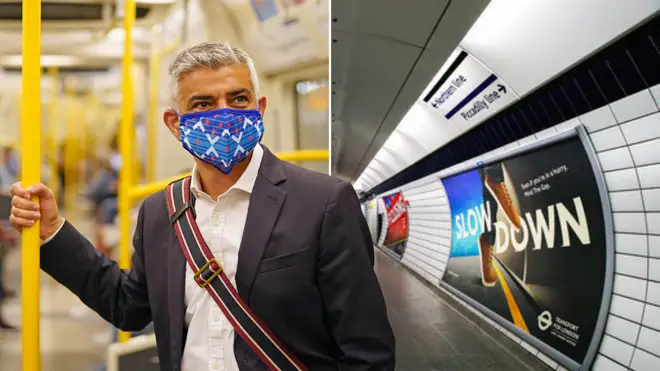
Shelagh Fogarty 1pm - 4pm
14 July 2021, 10:07

Sadiq Khan has announced that face masks will remain compulsory on London transport after July 19.
Earlier this week, Prime Minister Boris Johnson confirmed the easing of lockdown restrictions will go ahead on Monday, as planned.
Part of the so-called "Freedom Day" is the relaxing of rules around face masks and coverings - with the law set to change across England, no longer making them a legal requirement.
However, the Mayor of London has today announced that face masks will remain compulsory on public transport in the capital, saying he was "not prepared" to put Tube, bus and train users "at risk".
Here's everything you need to know about the update.
Speaking to Good Morning Britain on July 14, Sadiq Khan said: "If you are in London, you need to follow the rules.
“By keeping face masks mandatory we will give Londoners and visitors the reassurance and confidence to make the most of what our city has to offer, while also protecting our heroic transport workers and those who may be vulnerable and rely on the network to get around our city."
He added: “It’s an extra layer of protection on top of TfL’s world-leading enhanced cleaning regime – and I’m sure Londoners will continue to do the right thing as they have done throughout the pandemic, and continue to wear a face covering on TfL services.”
A recent poll by travel watchdog TransportFocus found that 56% of Londoners say they will not use public transport "unless passengers are required to wear a face covering".
When asked about how the rules would be enforced across London, Mr Khan replied: "We employ a number of enforcement officers, over 400. They will be making sure if anyone's not wearing a face mask, they will be reminded of the importance of doing so.
"It's not perfect. [It] would have been better if national rules applied across the country to avoid any confusion.
"The government for their own reasons have decided not to do that."
According to Transport for London, enforcement officers stopped almost 212,000 people in the past year from getting on public transport until they put on a face covering.
Around 3,200 were ejected from services for not adhering to the rules, and 4,300 fixed penalty notices were issued.
Andy Byford, London’s transport commissioner, said: “I would like to thank the vast majority of people using our services, who have followed the rules and helped control the virus and keep each other, and our staff, safe.
“I urge everyone to continue to follow the requirements so that we can continue to build confidence, and get back to the many wonderful things about London that we have missed during the pandemic.”
As of July 19, face masks will no longer be a legal requirement in England.
During his announcement this week, Mr Johnson said that while coverings were no longer going to be mandatory, he did expect masks to be worn in busy places and on transport.
Mr Khan has, therefore, made face masks a legal condition in a legal agreement between TfL and its customers.
London is now the first English city to enforce face coverings after national restrictions have been eased.
Nicola Sturgeon, meanwhile, announced on Tuesday that face coverings will remain for "some time" in Scotland, despite the easing of most restrictions. These rules will apply in shops, pubs and restaurants, and on public transport.
Conditions of carriage are contractual conditions between passengers and the network.
They extend across buses, the London Underground, DLR, Overground, Trams and rail services.
You can read the full list of conditions here.